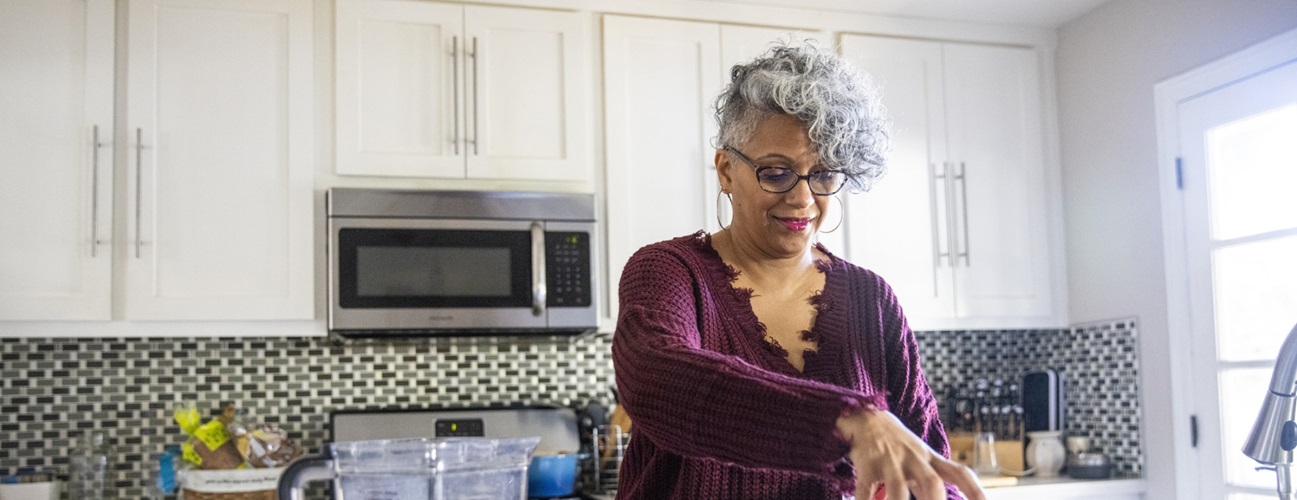


Cancer can affect every aspect of your health, including your appetite and diet. Selvi Rajagopal, M.D., a specialist in internal medicine at Johns Hopkins Medicine, explains why your diet is so important during cancer treatment, and provides tips on foods to add and avoid.
Treatments such as chemotherapy and some forms of radiation therapy can cause a variety of side effects, including:
“Sometimes it also depends on the specific type of cancer you have,” explains Rajagopal. “Treatment for breast cancer and blood cancers often involve steroids. Steroids can actually increase your appetite and increase your blood sugar levels, which might lead to insulin resistance and weight gain. So instead of losing weight, it’s possible to gain quite a bit of weight from the combination of medications and a more sedentary lifestyle during cancer treatment.”
Some people also have hormone therapy after chemotherapy for breast cancer or endometrial cancer. The drugs suppress production of estrogen, a hormone that plays an important role in metabolism. If your metabolism slows down, you may put on weight.
People with pancreatic cancer often find it difficult to maintain their weight. Since the pancreas isn’t functioning the way it should, they may not be able to digest food normally. This can lead to weight loss or malnourishment.
Since cancer treatment can lead to fluctuations in appetite and body weight, it’s important to pay close attention to your diet. In addition to helping you maintain a healthy weight, eating a balanced diet during chemotherapy or radiation therapy can:
“Anyone with a chronic illness, even if it’s not cancer, should eat foods high in protein, healthy fats, whole grains, and vitamins and minerals,” Rajagopal emphasizes. “If possible, make these dietary adjustments before cancer treatment begins so you’ll be healthier going into treatment.
Some of the best foods to eat during chemotherapy or other cancer treatments are plant-based proteins. They offer the highest levels of vitamins and minerals, Rajagopal says. This means eating lots of vegetables as well as beans, legumes, nuts and seeds. If you do eat animal proteins, choose lean options like chicken or fish.
Monounsaturated and polyunsaturated fats also have health benefits. Avocados, olive oil, grapeseed oil and walnuts are all high in omega-3 fatty acids, which help combat inflammation and improve cardiovascular health.
When choosing carbohydrates, opt for foods that are minimally processed, like whole wheat, bran and oats. These have soluble fiber, which helps maintain good gut bacteria. Soluble fiber also promotes the production of short-chain fatty acids (SCFAs), which lend a hand to everything from metabolism to cellular repair.
“Vitamins and minerals help our bodies’ enzymatic processes, which play a big role in boosting immune function and reducing inflammation,” Rajagopal says. When possible, select foods fortified with vitamin D. These may include milk, orange juice, yogurt and some cereals.
If you’re not eating as much as usual during treatment, or if you have side effects like vomiting and diarrhea that cause you to lose vitamins and nutrients, you might consider taking a multivitamin.
“Vitamin D tends to be the most common vitamin deficiency,” says Rajagopal. “Vitamin D helps keep your immune system strong, reduces fatigue and supports bone health. Especially if you’re on steroids, you’ll be at risk for bone density loss.”
Talk to a registered dietitian and your oncologist before adding any vitamins or supplements to your diet.
Some dietary changes can help you manage side effects after your treatment begins. These side effects include:
Be aware of what’s going into your body during cancer treatment. Read nutrition labels and prepare as much of your own food as you can. It’s best to stay away from highly refined, processed food. You should also avoid fried foods that contain a lot of hydrogenated oils, which can increase inflammation.
Since people with cancer often have compromised immune systems, consider skipping foods that carry the risk of foodborne illnesses, including:
Registered dietitians have specialized training in the nutritional needs of people with specific diseases. Your dietitian can help you plan meals that give you the right number of calories and nutrients.
“It’s also important to build an eating plan that’s practical for you,” says Rajagopal. If you’re busy in the evenings and don’t have the time or energy to cook, try to select healthy takeout options. If you’re on a budget, adding inexpensive, nutritious foods like beans or frozen fruit or vegetables to simple meals can go a long way.